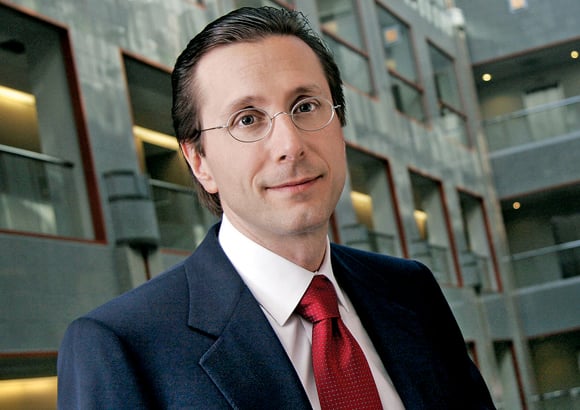Bruce Berkowitz appears to be staying away from some of his more controversial stock picks in his newest fund, The Fairholme Allocation Fund. Among the most notable absences from the top holdings of the new fund are American International Group — the flagship Fairholme Fund's top holding — and St. Joe Corp., which has received much press and attention from investors.
Bruce Berkowitz appears to be staying away from some of his more controversial stock picks in his newest fund, The Fairholme Allocation Fund. Among the most notable absences from the top holdings of the new fund are American International Group — the flagship Fairholme Fund's top holding — and St. Joe Corp., which has received much press and attention from investors.
Morgan Stanley — another Fairholme Fund top holding — isn't included in the newer Fairholme Allocation Fund.
The allocation fund's holdings were first disclosed April 27, but are as of Feb. 28.
The firm launched the Fairholme Allocation Fund Ticker:(FAAFX) for investors who are worried about the size of the $16.9 billion Fairholme Fund Ticker(FAIRX). Unlike its bigger counterpart, the Fairholme Allocation Fund is more nimble and able to buy smaller-cap companies than The Fairholme Fund.
That's not to say the two funds don't overlap. The top holding of the Fairholme Allocation Fund is municipal bond insurer MBIA Inc., which makes up 13.79% of the portfolio and 1.17% of the Fairholme Fund. Other names that appear in both funds are Sears Holdings Corp., Bank of America Corp. and The Goldman Sachs Group Inc.
But the fact that AIG isn't one of the top holdings of the Fairholme Allocation fund is significant. Over the years, Mr. Berkowitz has been a staunch defender of his position in AIG — which made up 7.6% of the Fairholme Fund as of Feb. 28.
“Their balance sheet looks better than anytime I can remember,” Mr. Berkowitz said in a Feb. 15 interview with InvestmentNews,
But in a May 2 conference call with shareholders, Mr. Berkowitz said he had been wrong about the price at which the U.S. government would be willing to sell its shares of AIG. He said he thought the U.S would sell its shares of AIG at $27 to $29, lower than the price Mr. Berkowitz paid for the shares, above $32.
“I was wrong,” he said. “I found it very hard to believe the government would sell its stake below book value and right now AIG is trading at two-thirds of book value.”
Mr. Berkowitz was traveling and couldn't be reached for comment, according to a spokeswoman.
St. Joe, of which the Fairholme Fund owns 30%, is notably absent from the Fairholme Allocation Fund.
Mr. Berkowitz made headlines last year when he bought more of the Florida real estate development company after David Einhorne, another well-known investor, announced he was shorting shares.
Although St. Joe accounts for only 3% of the Fairholme Fund, the firm has spent a lot of time on the position. Mr. Berkowitz joined the company's board late last year, only to resign six weeks later, citing differences with management.
Then in February, he was successful in removing St. Joe's chief executive, Britt Greene, and three other board members. On March 4, Mr. Berkowitz was named chairman.
It could be that Mr. Berkowitz doesn't want both portfolios to be exactly the same, said Ryan Leggio, a Morningstar Inc. analyst. “This fund is supposed to appeal to existing Fairholme owners,” he said. “Do they need two portfolios that look exactly the same?”
And looking at the most recent performance, it seems that things may look very differently even now, he said. As of Feb. 28, the Fairholme Allocation Fund had 56% in cash instruments, while the Fairholme Fund had 25.5% in cash. That would imply that the former fund's performance should be appreciably better than the latter, Mr. Leggio said.
But as of May 13, the Fairholme Allocation Fund was down 2.28% for the past month; while the Fairholme Fund was down 2.75%. Meanwhile, the Allocation Fund's biggest holding, MBIA, is up 2.35% for the past month.
“It seems like he has probably put more of that cash to work,” Mr. Leggio said.







